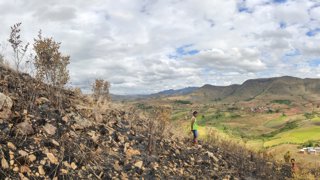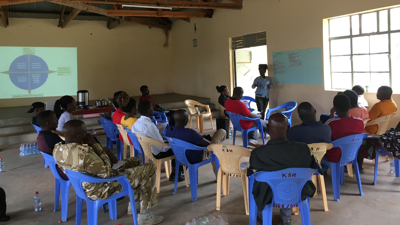-Maureen-Kinyanjui.JPG)
The year’s projects span six continents and 36 countries, with many grant recipients already out in the field. We caught up with some of this year’s Society-supported researchers and school groups to hear what they’ve been up to.
Maureen Kinyanjui a PhD student from the University of Edinburgh, co-supervised by the University of Edinburgh and University of Oxford, recently returned from a month of fieldwork in Kenya, where she sought to determine the conditions needed to enable human-elephant coexistence despite rapidly changing social and ecological environments. Maureen’s research was supported in part by the Frederick Soddy Trust. She told us:
“Sustainable human-elephant coexistence amidst rapid socio-ecological changes relies on how community individuals feel about themselves (do they feel empowered or dis-empowered?), what type of emotions they experience and how quickly they adapt to the socio-ecological changes they are experiencing. The less adaptable the community is to the changes, the more elephants become a source of tension and outward conflicts are more likely.”
One of the schools in receipt of support through this year’s Frederick Soddy Schools Awards is Leopold Primary School. With the support, the school’s geography lead, Alba Alvarez, took Year 3 pupils to the River Thames Boat Project at Teddington Lock. As well as learning about the physical geography of rivers, pupils took part in science experiments analysing the river water and explored the environment around Teddington Lock and the effects of plastic pollution in the area. Alba said: “The trip really added to the children's learning, and they thoroughly enjoyed the outing! Thank you for making this experience possible for the children.”
Elliot Convery Fisher at the University of Edinburgh and Royal Botanical Gardens Edinburgh recently returned from two months in Madagascar, supported by the Society’s Albert Reckitt Award. Elliot has been researching the use of fire in grasslands and savannahs, and the effect of fire on rare plants. Elliot’s work will inform conservation efforts in endangered fire-driven ecosystems.
Elliot told us: “The main findings to date are that fire is essential to local livelihoods. Whilst fire is used for a variety of reasons, some practical, some cultural and others criminal, it is in agriculture where the properties of fire stand out. In places which have received little support in terms of agricultural inputs and technologies, such as in rural Betsileo communities, fire is essential for people to make a living from the land.
“The coming phase [of research] involves the vital task of analysing the collected data and translating it into a comprehensive written account. This fieldwork serves as a crucial pillar of my overarching PhD research, forming the foundation of my understanding of fire use in the region.”

Image: Grasslands in Madagascar after a small agricultural fire intended to ward off hungry locusts accidently spread into the surrounding areas.
Read more about Elliot’s project here and see the full list of projects supported this year.
